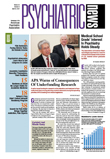Vagus nerve stimulation (VNS) therapy, a $25,000 treatment administered by an implanted medical device manufactured by Cyberonics, has been approved for the treatment of refractory depression by the Food and Drug Administration (FDA). But the success of VNS in patients with treatment-resistant depression has not been demonstrated. An acute-phase, randomized, controlled trial of VNS, a study by Dr. John Rush and colleagues published in the September 2005 Biological Psychiatry, did not yield definitive evidence of short-term efficacy for the therapy. A follow-up, long-term study of these patients showed some improvement; however, this finding is not interpretable because patients were unblinded, and some also received ECT or antidepressant medications.
In July 2005 Dr. Daniel Schultz, the director of the FDA's Center for Devices and Radiological Health (CDRH), signed a final approval letter for VNS as a treatment for refractory depression despite the fact that no further robust studies had been published. Usually the director of CDRH is not involved in such decisions, but in this instance Dr. Schultz overruled more than 20 FDA staff scientists, medical officers, and management staff opposed to approval, precipitating a U.S. Senate investigation and official criticism (“Review of the FDA's Approval Process for the Vagus Nerve Stimulation Therapy System for Treatment-Resistant Depression,” prepared by the staff of the Committee on Finance, U.S. Senate, February 2006).
On September 9, 2006, APA submitted an official letter endorsing Medicare reimbursement for VNS after consulting with APA's Council on Research. It is not clear whether this was based upon a scientific review of VNS treatment, and whether the endorsement followed an actual meeting or a conference call. Are minutes of the meeting available? One member of the Council on Research, Dr. Charles Nemeroff, had been associated with a potential conflict of interest related to VNS because of an article in the July 2006 Neuropsychopharmacology of which he was one of the authors. Also, APA accepted money from Cyberonics at least four separate times, in 2002, 2004, 2005, and 2006. Also, Cyberonics has been a target of an SEC investigation for backdating of stock options, and its CEO and CFO resigned recently in the midst of the fallout from the backdating.
On February 5 the Medicare Coverage and Analysis Group at the Centers for Medicare and Medicaid Services (CMS) proposed that Medicare adopt a“ national noncoverage determination” for VNS for patients with treatment-resistant depression who had received or had refused electroconvulsive therapy or who had been hospitalized for depression. CMS stated that “vagus nerve stimulation is not reasonable and necessary for treatment of resistant depression” and that research “provides little evidence that a patient will experience a health benefit as a direct result of VNS therapy” (CMS Medicare Coverage Database, 2007; posted at<www.cms.hhs.gov/mcd/viewdraftdecisionmemo.asp?id=195>). CMS is expected to make a final decision on the noncoverage proposal for VNS in May.
Medicare reimbursement for VNS would absorb considerable finances, reducing funds available for proven treatments. APA's official support for Medicare reimbursement did not consider input from members of APA's Medicare Corresponding Committee (MAC), which serves as an information-gathering body for APA as psychiatry representatives to states' Medicare advisory committees. By September 6, 2006, Cyberonics had sought and had been denied approval by 10 local CMS contractors from 14 states, according to a press release from Public Citizen.
The risks of using an expensive, invasive, and unproven treatment for refractory depression are obvious. APA should explain its support of this controversial VNS therapy.
